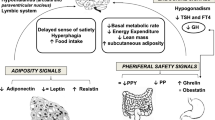Abstract
The adiposogenital syndrome develops during the puberal period starting from a particular family constellation, that is described. The origins of the pathological alteration are found at the first object relationships, where feeding is felt as self-feeding. Food normally plays the role of transitional object in child. In these cases, this role fails and ends by helping separation denial. Fat is laid on the intermediate space as a fetish object, a witness of the omnipoten fantasy of antistic feeding. The child develops a great ability to maintain this balance, making eating a highly pleasant activity. Difficulties encountered during treatment are commented.
Similar content being viewed by others
References
Marañón G.: El Crecimiento y sus Trastornos. Madrid, Espasa Calpe, 1958.
Bruch H.: Eating Disorders: Obesity, Anorexia Nervosa and the Person Within. New York, Basic Books, 1973.
Rascovsky A., Rascovsky M.W. de, Schlossberg T.: Estructura Psíquica Básica del Obeso. Rev. Psicoanálisis, 8, 1951.
Minuchin S., Rosman B., Baker L.: Psychosomatic families. Harvard Univ. Press, Cambridge, Mass, 1978.
Losso R: La dimensión familiar del lenguaje del cuerpo. Jornadas Departamento de Psicosomática. Buenos Aires, Asociación Psicoanalítica Argentina.
MacDougall J.: Théatres du jeu. Paris, Gallimard, 1989.
Winnicott D.W.: The Maturational Process and the Facilitating Environment. London, Hogarth Press, 1965.
Losso R.: La Obesidad como Expresión de una Perturbación de la Personalidad. Acta Psiquiátr. Psicol. Am. Lat., 10, 104, 1964.
Abadi M.: Nota acerca de Algunos Mecanismos en la Psicogénesis de la Obesidad. Rev. Psicoanálisis, 13, 296, 1956.
Marty P., D’Uzan M.: El pensamiento operatorio. Rev. Psicoanálisis, 40, 711, 1983.
Sifneos P.: Problems of psychotherapy in patients with alexithymic characteristics and physical disease. Psychother. Psychosom., 26, 1975.
Winnicott D.W.: Transitional Objects and Transitional Phenomena. In: Playing and Reality. London, Tavistock Publications, 1971.
Gaddini R., Gaddini E.: Transitional Objects and the Process of individuation. J. Am. Acad. Child Adolesc. Psychiatry, 9, 34, 1970.
Grinker J., Hirsch J.: Metabolic and Behavioral Correlate of Obesity. In: Physiology, Emotion and Psychosomatic Illness. Amsterdam, Elsevier Excerpta Medica, 1972.
Losso R., Ferrazzano De Solvey R.: El cuerpo: un campo de batalla. Actas XIV Congreso Interno y XXIV Simposio “La Agresión”. Buenos Aires, Asociación Psicoanalítica Argentina, 1985.
Losso R.: Mente y Hormonas. Un Enfoque Psicosomático de la Endocrinología. Buenos Aires, Proyecto CINAE, 1983.
Author information
Authors and Affiliations
Rights and permissions
About this article
Cite this article
Losso, R. Prepuberal obesity (the adiposogenital syndrome): A transitional object pathology. Eat Weight Disord 2, 160–163 (1997). https://doi.org/10.1007/BF03339968
Received:
Accepted:
Published:
Issue Date:
DOI: https://doi.org/10.1007/BF03339968




